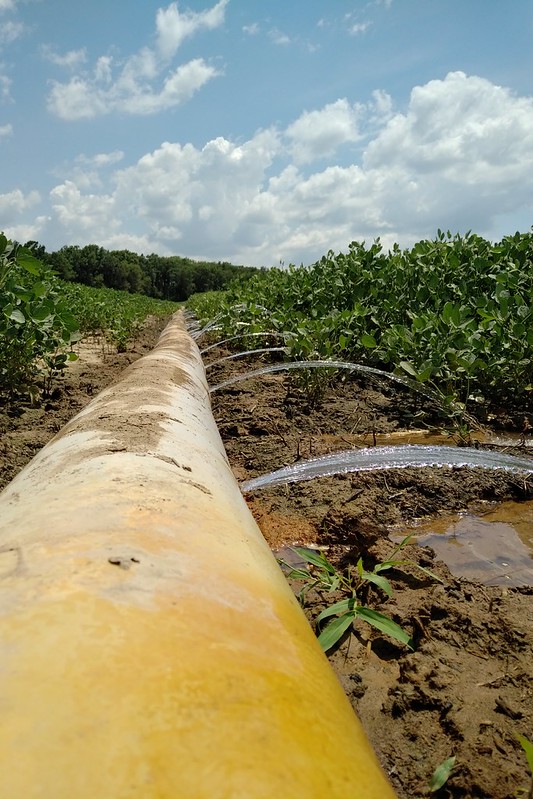Sept. 4, 2020
Virtual tour offers up-close look at surge irrigation
By Tracy Courage
U of A System Division of Agriculture
Fact Facts:
- Sept. 10 virtual field trip showcases Arkansas Discovery Farm in Cherry Valley
- Tour soybean and rice farm via Zoom; no charge to attend
(537 words)
(Download this story in MS Word format here.)
CHERRY VALLEY, Ark. — Mike Wood uses technology on his Cross County soybean and rice farm in Cherry Valley, Arkansas, to protect and improve water quality and help reduce water use. Computerized irrigation management, the use of soil moisture sensors and surge valve irrigation are just a few of the tools in use as part of his participation in the Arkansas Discovery Farms program.
A virtual tour of Wood’s farm will be available free online to anyone interested in learning about how technology can improve water quality and conserve water usage. The one-hour virtual tour will be available as a Zoom webinar beginning at 10 a.m., CDT, on Sept. 10.
Mike Wood and his son, Derek, will discuss their farm operations. Mike Daniels, professor of soil and water, and Mike Hamilton, irrigation instructor, both with the University of Arkansas System Division of Agriculture, will discuss research at the farm, where half of a furrow-irrigated soybean field was irrigated with polytube furrow irrigation and the other half with polytube furrow irrigation with a surge valve.
“We have our edge-of-field water quality monitoring equipment set up to monitor and collect samples from all tailwater runoff from each half of the field,” said tour host Lee Riley, program assistant with extension’s Crop, Soil & Environmental Sciences department. “This allows us to compare the surge valve side to the non-surge valve side, for tailwater and nutrient loss. We also have soil moisture sensors on each half of the field to compare water infiltration depth into the soil.”
Their data shows that adding a surge valve to the Wood's furrow-irrigated soybeans has increased irrigation efficiency by increasing water infiltration into the soil and reducing tailwater losses, Riley said.
The tour is part of the Arkansas Soil & Water Conservation Virtual Field Trip Series, funded by the U.S. Department of Agriculture’s Natural Resources and Conservation Service and hosted by the University of Arkansas System Division of Agriculture. It is an effort of both the research and extension arms of the Division of Agriculture, the Arkansas Agricultural Experiment Station and the Cooperative Extension Service.
For people not able to view the virtual tour as it is broadcast, a recording will be available on the Division of Agriculture’s YouTube channel at https://bit.ly/2MQmLW1.
The field trip is part of the Arkansas Soil & Water Conservation Virtual Field Trip Series. It focuses on the conservation benefits researchers have developed concerning water quality, irrigation water use, climate change, soil health, profitability and sustainability through their partnership with farmers on selected farms, including some farmers involved in the Arkansas Discovery Farms Program.
The USDA Natural Resources and Conservation Service provides funding to the Division of Agriculture to integrate the efforts of the Arkansas Discovery Farms program and the Arkansas Soil Health Alliance. The goal is to educate a statewide network of participants through a series of no-cost virtual research-based, interactive demonstrations and educational experiences.
To learn more about extension programs in Arkansas, contact your local Cooperative Extension Service agent or visit www.uaex.uada.edu. Follow us on Twitter at @AR_Extension.
About the Division of Agriculture
The University of Arkansas System Division of Agriculture’s mission is to strengthen agriculture, communities, and families by connecting trusted research to the adoption of best practices. Through the Agricultural Experiment Station and the Cooperative Extension Service, the Division of Agriculture conducts research and extension work within the nation’s historic land grant education system.
The Division of Agriculture is one of 20 entities within the University of Arkansas System. It has offices in all 75 counties in Arkansas and faculty on five system campuses.
Pursuant to 7 CFR § 15.3, the University of Arkansas System Division of Agriculture offers all its Extension and Research programs and services (including employment) without regard to race, color, sex, national origin, religion, age, disability, marital or veteran status, genetic information, sexual preference, pregnancy or any other legally protected status, and is an equal opportunity institution.
# # #
Media contact:
Tracy Courage
Director, Communications Services
U of A System Division of Agriculture
Cooperative Extension Service
(501) 671-2126
tcourage@uada.edu
